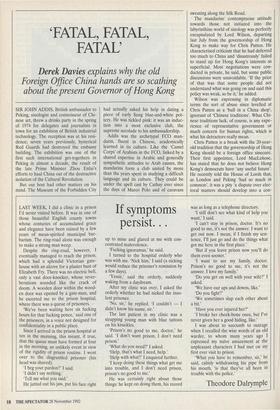If symptoms
persist.. .
LAST WEEK, I did a clinic in a prison I'd never visited before. It was in one of those beautiful English county towns whose centuries of accumulated grace and elegance have been ruined by a few years of mean-spirited municipal bar- barism. The ring-road alone was enough to make a strong man weep.
Despite the ring-road, however, I eventually managed to reach the prison, which had a splendid Victorian gate- house with an alcove for a plaster bust of Elizabeth Fry. There was no electric bell, only a vast door-knocker, whose rever- berations sounded like the crack of doom. A wooden door within the wood- en door was opened by a gate-man, and he escorted me to the prison hospital, where there was a queue of prisoners.
`We've been waiting here six fucking hours for that fucking ponce,' said one of the prisoners, in a voice not designed for confidentiality in a public place.
Since I arrived in the prison hospital at ten in the morning, this meant, if true, that the queue must have formed at four in the morning, an unlikely event in view of the rigidity of prison routine. I went over to the disgruntled prisoner (his head was shaved).
`I beg your pardon?' I said.
`I didn't say nothing.'
`Tell me what you said.'
He jutted out his jaw, put his face right up to mine and glared at me with con- centrated malevolence.
`Fucking ignoramus,' he said.
I turned to the hospital orderly who was with me. 'Nick him,' I said (a nicking would reduce the prisoner's remission by a few days).
`Yessir,' said the orderly, suddenly waking from a daydream.
After my clinic was over, I asked the orderly whether he had nicked the inso- lent prisoner.
`No, sir,' he replied. 'I couldn't — I didn't know his name, sir.'
The last patient in my clinic was a strapping young man with blue tattoos on his knuckles.
`Prison's no good to me, doctor,' he said. 'I don't want prison, I don't need prison.'
`What do you need?' I asked.
`Help, that's what I need, help.'
`Help with what?' I enquired further.
`I keep doing these things what get me into trouble, and I don't need prison, prison's no good to me.'
He was certainly right about those things: he kept on doing them, his record was as long as a telephone directory.
`I still don't see what kind of help you want,' I said.
`I can't stay in prison, doctor. It's no good to me, it's not the answer. I want to get out now. I mean, if I finish my sen- tence, I'll just go and do the things what got me here in the first place.'
`But if you leave prison now you'll do them even sooner.'
`I want to see my family, doctor. Prison's no good to me, it's not the answer. I love my family.'
`Do you get on well with your wife?' I asked.
`We have our ups and downs, like.' `Do you fight?'
`We sometimes slap each other about a bit.'
`Have you ever injured her?'
`I broke her cheek-bone once, but I've never given her a good hiding, like.'
I was about to succumb to outrage when I recalled the wise words of an old warder, to whom many years ago I expressed my naïve amazement at the unpleasant characters I had met on my first ever visit to prison.
`What you have to remember, sir,' he said, calmly withdrawing his pipe from his mouth, 'is that they've all been in trouble with the police.'
Theodore Dalrymple










































































 Previous page
Previous page